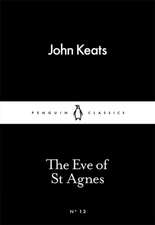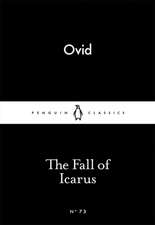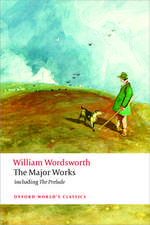The Faerie Queene
Autor Edmund Spenser Editat de C O'Donnell, Thomas Rocheen Limba Engleză Paperback – 28 iun 1978
| Toate formatele și edițiile | Preț | Express |
|---|---|---|
| Paperback (8) | 116.63 lei 10-16 zile | |
| Oxford University Press – 10 feb 1970 | 116.63 lei 10-16 zile | |
| Penguin Books – 28 iun 1978 | 123.84 lei 25-31 zile | +53.32 lei 6-12 zile |
| Mint Editions – 8 aug 2023 | 162.46 lei 22-36 zile | |
| Hackett Publishing Company – oct 2008 | 413.02 lei 22-36 zile | |
| CreateSpace Independent Publishing Platform – | 228.06 lei 43-57 zile | |
| Hansebooks – 28 feb 2019 | 262.68 lei 38-44 zile | |
| Hansebooks – 5 mar 2019 | 282.90 lei 38-44 zile | |
| Cambridge University Press – 18 dec 2013 | 329.02 lei 43-57 zile |
Preț: 123.84 lei
Preț vechi: 143.57 lei
-14% Nou
Puncte Express: 186
Preț estimativ în valută:
23.70€ • 24.81$ • 19.61£
23.70€ • 24.81$ • 19.61£
Carte disponibilă
Livrare economică 20-26 martie
Livrare express 01-07 martie pentru 63.31 lei
Preluare comenzi: 021 569.72.76
Specificații
ISBN-13: 9780140422078
ISBN-10: 0140422072
Pagini: 1248
Ilustrații: illustrations
Dimensiuni: 133 x 198 x 56 mm
Greutate: 0.82 kg
Editura: Penguin Books
Colecția Penguin Classics
Locul publicării:London, United Kingdom
ISBN-10: 0140422072
Pagini: 1248
Ilustrații: illustrations
Dimensiuni: 133 x 198 x 56 mm
Greutate: 0.82 kg
Editura: Penguin Books
Colecția Penguin Classics
Locul publicării:London, United Kingdom
Notă biografică
Cuprins
The Faerie QueeneA Note on the Text
Table of Dates
Further Reading
A Letter of the Authors
Commendatory Verses
Dedicatory Sonnets
Table of Dates
Further Reading
A Letter of the Authors
Commendatory Verses
Dedicatory Sonnets
Book I
Book II
Book III
Book IV
Book V
Book VI
Two Cantos of Mutabilitie
Textual Appendix
Notes
Common Words
Recenzii
"Each of the five volumes published by Hackett (the last of which is co-edited and introduced by Andrew Hadfield) has an introduction that sets the scene and orients the reader towards the particular book of the poem being dealt with, followed by the complete text with a glossary at the bottom of each page. By breaking down the epic into five individual volumes, readers can set their own pace and choose which book to read, and the clear print and spacing on the page makes the enterprise of embarking on The Faerie Queene a most manageable and ultimately enjoyable experience." - Sen Sheehan, Irish Left Review, September 10th, 2012
Two editions of Spenser are both from the same series, published by Hackett Publishing Company, which is providing inexpensive paperback volumes of The Faerie Queene , under the general editorship of Abraham Stoll. The volumes printed this year, books 1 and 5, are edited, respectively, by Carol V. Kaske and Stoll himself. A single volume combining books 3 and 4, edited by Dorothy Stephens, is forthcoming, as is book 6, edited by Andrew Hadfield. The volumes are attractively printed, with notes at the bottom of the page. Each volume includes an introduction, the Letter to Raleigh , a brief 'Life of Edmund Spenser,' textual notes, a glossary, an 'Index of Characters,' and a bibliography. Kaske's introduction to book 1 forms an accessible student guide, touching on a wide range of topics, from versification, genre, and allegory, to 'Spenser's Religious Milieu.' At the same time, there are fresh flashes of insight, no doubt derived from Kaske's long experience of teaching a complex poem. . . . Eschewing 'political and biographical allegory (p. xvi), the notes offer plenty of help to the student seeking to get behind the veil of Spenser's dark conceit, for they emphasize symbolism and historical context, especially literary context or 'sources.' Stoll's edition of book 5 of the Faerie Queene includes a judicious introduction of considerable merit. Not simply well written and learned, it partitions the information in an accessible and interesting way. Stoll is fully attuned to the recent controversies surrounding the Legend of Justice, but he does more than record them for the student reader; he manages to express sympathy for both poet and poem. Students need to hear the historical nature of Spenser's achievement for English literature, and Stoll leads nicely with this topic: book 5 is 'one of the most challenging meditations on justice in English literature' (p. ix). Stoll is as sensitive to the violence of book 5 as he is to its strangeness and beauty. Students will appreciate the short inventory of important works of criticism at the end of each section. The notes are not as full as Kaske's, but perhaps appropriately so. . . . I look forward to having access to the remaining volumes in this series. --Patrick Cheney, Studies in English Literature 1500-1900
Teachers of Spenser will also welcome two more installments of the Hackett editions of separate books of The Faerie Queene under the general editorship of Abraham Stoll, this time on books 2 and on books 3 and 4. In my view, these are the most attractive, inexpensive, but also comprehensive editions to date, with far better (and easy to read) notes on mythology and name symbolism (matters increasingly foreign to our undergraduates) than almost all previous versions. --Catherine Gimelli Martin, Studies in English Literature 1500-1900
The multivolume format provides varied introductions and annotations--a benefit to any student--and facilitates the general reading experience through smaller bindings. The prefatory material of individual volumes focuses on history, subjects, and ideologies pertinent to specific books. The edition is thus ideal for classroom use, especially in survey courses or for those who prefer to read several individual books rather than study the poem in its entirety. The format and language of the editorial input lend themselves to undergraduate study. These editions offer a solid analytical grounding for readers at various levels, and together compile a sound and substantial set of editorial perspectives on Spenser's most famous work. --Rachel E. Frier, Sixteenth Century Journal
Two editions of Spenser are both from the same series, published by Hackett Publishing Company, which is providing inexpensive paperback volumes of The Faerie Queene , under the general editorship of Abraham Stoll. The volumes printed this year, books 1 and 5, are edited, respectively, by Carol V. Kaske and Stoll himself. A single volume combining books 3 and 4, edited by Dorothy Stephens, is forthcoming, as is book 6, edited by Andrew Hadfield. The volumes are attractively printed, with notes at the bottom of the page. Each volume includes an introduction, the Letter to Raleigh , a brief 'Life of Edmund Spenser,' textual notes, a glossary, an 'Index of Characters,' and a bibliography. Kaske's introduction to book 1 forms an accessible student guide, touching on a wide range of topics, from versification, genre, and allegory, to 'Spenser's Religious Milieu.' At the same time, there are fresh flashes of insight, no doubt derived from Kaske's long experience of teaching a complex poem. . . . Eschewing 'political and biographical allegory (p. xvi), the notes offer plenty of help to the student seeking to get behind the veil of Spenser's dark conceit, for they emphasize symbolism and historical context, especially literary context or 'sources.' Stoll's edition of book 5 of the Faerie Queene includes a judicious introduction of considerable merit. Not simply well written and learned, it partitions the information in an accessible and interesting way. Stoll is fully attuned to the recent controversies surrounding the Legend of Justice, but he does more than record them for the student reader; he manages to express sympathy for both poet and poem. Students need to hear the historical nature of Spenser's achievement for English literature, and Stoll leads nicely with this topic: book 5 is 'one of the most challenging meditations on justice in English literature' (p. ix). Stoll is as sensitive to the violence of book 5 as he is to its strangeness and beauty. Students will appreciate the short inventory of important works of criticism at the end of each section. The notes are not as full as Kaske's, but perhaps appropriately so. . . . I look forward to having access to the remaining volumes in this series. --Patrick Cheney, Studies in English Literature 1500-1900
Teachers of Spenser will also welcome two more installments of the Hackett editions of separate books of The Faerie Queene under the general editorship of Abraham Stoll, this time on books 2 and on books 3 and 4. In my view, these are the most attractive, inexpensive, but also comprehensive editions to date, with far better (and easy to read) notes on mythology and name symbolism (matters increasingly foreign to our undergraduates) than almost all previous versions. --Catherine Gimelli Martin, Studies in English Literature 1500-1900
The multivolume format provides varied introductions and annotations--a benefit to any student--and facilitates the general reading experience through smaller bindings. The prefatory material of individual volumes focuses on history, subjects, and ideologies pertinent to specific books. The edition is thus ideal for classroom use, especially in survey courses or for those who prefer to read several individual books rather than study the poem in its entirety. The format and language of the editorial input lend themselves to undergraduate study. These editions offer a solid analytical grounding for readers at various levels, and together compile a sound and substantial set of editorial perspectives on Spenser's most famous work. --Rachel E. Frier, Sixteenth Century Journal















